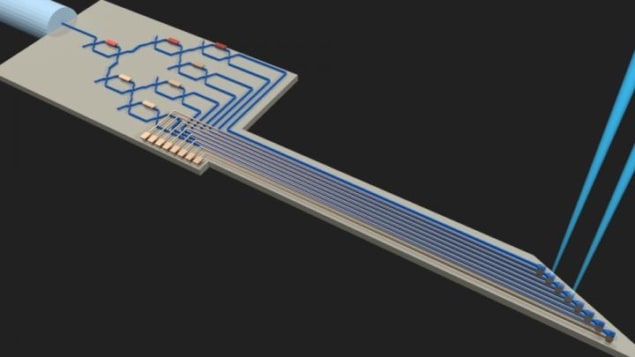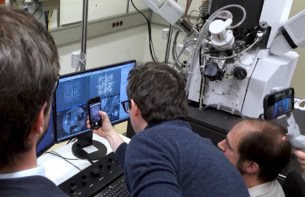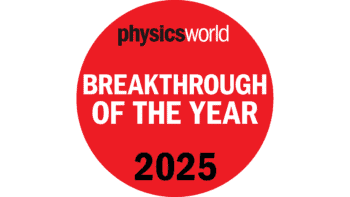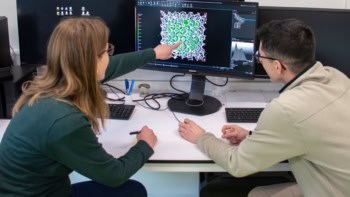
A new chip-based device that can shape and steer blue light could significantly reduce the size of the light projection components used in emerging applications such as augmented and virtual reality, autonomous vehicles, optogenetics and even trapped-ion quantum computers. So say researchers at Columbia University in New York led by Michal Lipson who have made an optical phased array (OPA) with a wide field of view that contains no moving parts.
Phased arrays consist of multiple connected antennas that produce an electronically steerable beam of electromagnetic waves. The beam is steered by applying different phases of light at each antenna such that the output waves interfere constructively in one direction and destructively in the other. To change the beam’s direction, light is delayed in one emitter or a phase is shifted relative to another.
Such antennas have long been used to transmit radio and television signals, but in the last decade or so researchers have begun to extend the phased-array concept to visible wavelengths. Since antennas work by oscillating charges along their structure, the size of the antenna must match the resonant mode of the wavelength of the electromagnetic radiation it supports. For visible light, that means shrinking the antenna down to the nanoscale.
OPAs offer an alternative to bulky devices
The light-projection components currently used to shape and steer visible light are bulky and have a limited field of view. While OPAs are smaller, they are usually made from silicon, which can only be used at longer, near-infrared wavelengths. Blue wavelengths (488 nm) require different semiconducting materials, such as silicon nitride (SiN), that can operate at visible wavelengths. However, these less-common semiconductors present additional challenges for fabrication and development.
Lipson’s team developed their SiN platform three years ago, and have now optimized it to operate at blue light wavelengths. One of the main difficulties they had to overcome was that blue wavelength light scatters more than other colours since it travels as shorter, smaller waves. This greater scattering leads to higher light losses if the device fabrication is not perfect, says the study’s co-lead author Min Chul Shin. Another challenge was to make a blue light beam that they could steer over a wide, 50-degree field of view.
Now that they have demonstrated an OPA that operates at blue wavelengths, the researchers say they could easily adapt their device design for longer red and green wavelengths. This broader wavelength range would open up applications such as optogenetic neural stimulation, in which visible light combines with genetic engineering to control neurons and other cells in living tissues. As an example, co-lead author Aseema Mohanty says the group’s chip-scale technology could be used to control an array of micron-scale beams to stimulate light-sensitive tags on neurons in animal models of brain disease.
Reducing power consumption
As well as optogenetics, the new blue OPA could come in useful in trapped ion quantum computers, which require lasers in the visible spectral range for micron-scale optical stimulation. It might also be used in ultra-small solid-state lidar on autonomous vehicles and for making significantly smaller and lighter AR/VR displays.
The researchers, who report their work in Optics Letters, now plan to reduce the electrical power consumption of their OPAs. Low-power operation will be crucial for the above-mentioned applications, they explain.



